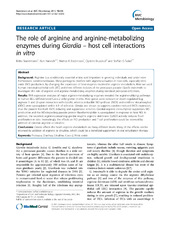The role of arginine and arginine-metabolizing enzymes during Giardia - host cell interactions in vitro
Peer reviewed, Journal article
Published version

Permanent lenke
https://hdl.handle.net/1956/8490Utgivelsesdato
2013-11-14Metadata
Vis full innførselSamlinger
Originalversjon
https://doi.org/10.1186/1471-2180-13-256Sammendrag
Background: Arginine is a conditionally essential amino acid important in growing individuals and under nonhomeostatic conditions/disease. Many pathogens interfere with arginine-utilization in host cells, especially nitric oxide (NO) production, by changing the expression of host enzymes involved in arginine metabolism. Here we used human intestinal epithelial cells (IEC) and three different isolates of the protozoan parasite Giardia intestinalis to investigate the role of arginine and arginine-metabolizing enzymes during intestinal protozoan infections. Results: RNA expression analyses of major arginine-metabolizing enzymes revealed the arginine-utilizing pathways in human IECs (differentiated Caco-2 cells) grown in vitro. Most genes were constant or down-regulated (e.g. arginase 1 and 2) upon interaction with Giardia, whereas inducible NO synthase (iNOS) and ornithine decarboxylase (ODC) were up-regulated within 6 h of infection. Giardia was shown to suppress cytokine-induced iNOS expression, thus the parasite has both iNOS inducing and suppressive activities. Giardial arginine consumption suppresses NO production and the NO-degrading parasite protein flavohemoglobin is up-regulated in response to host NO. In addition, the secreted, arginine-consuming giardial enzyme arginine deiminase (GiADI) actively reduces T-cell proliferation in vitro. Interestingly, the effects on NO production and T cell proliferation could be reversed by addition of external arginine or citrulline. Conclusions: Giardia affects the host’s arginine metabolism on many different levels. Many of the effects can be reversed by addition of arginine or citrulline, which could be a beneficial supplement in oral rehydration therapy.
Utgiver
BioMed CentralTidsskrift
BMC MicrobiologyOpphavsrett
Copyright 2013 Stadelmann et al.; licensee BioMed Central Ltd.Britta Stadelmann et al.; licensee BioMed Central Ltd.
